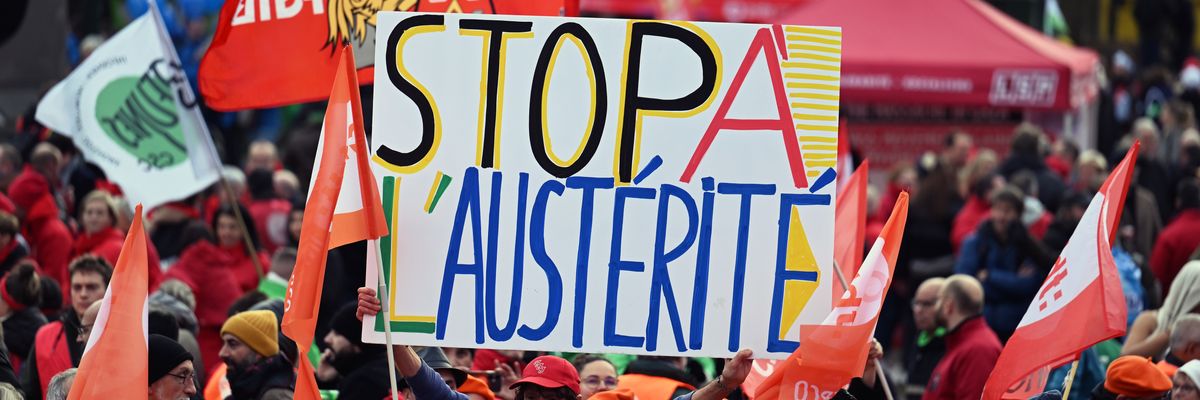Labor leaders in the European Union on Tuesday estimated that 15,000 people from across the bloc had traveled to central Brussels to march against austerity measures expected to go into effect after the New Year, with workers demanding fair wages and sufficient funding for public services.
Organized by the European Trade Union Confederation (ETUC) and other labor organizations representing workers in the agricultural, tourism, and food industries, among others, the march through the E.U.'s capital was planned in response to the Stability and Growth Pact—a set of economic rules that were paused during the coronavirus pandemic.
The rules that are set to go into effect again in 2024, following months of negotiations by finance ministers, require that member states' public debt doesn't exceed 60% of their gross domestic product and that their annual deficit stay below 3%.
The ETUC said 14 of the E.U.'s 27 member states would be required to cut a combined 45 billion euros ($49 billion) from their budgets next year under the plan, followed by more cuts in the coming years.
In a letter to the European Council on Monday, the union, which represents 45 million workers, noted that wages are already falling in the bloc, despite the fact that profit margins of corporations are increasing.
"Further austerity would have a devastating effect on the economy and on workers, deepening the social justice emergency," wrote Esther Lynch, general secretary of the ETUC, noting that the early days of the pandemic in 2020 saw European governments invest in public health measures and worker protections. "We must maintain a solidaristic and forward-looking approach."
The union called on the council to approve a further one-year extension of the Stability and Growth Pact's "escape clause," which was invoked in 2020.
"The ETUC is calling for a rethink," wrote Lynch. "A smarter reform is needed. The austerity measures imposed following the financial crisis had a profoundly damaging effect on Europe, with the scars still visible in our economy, our society, and our politics."
The New Economic Foundation released an analysis last year showing that without restrictions on public spending that were imposed in the E.U. after the 2008 financial meltdown, the average citizen of the bloc would be more than $3,000 better off, and governments would have invested $575 billion more in infrastructure and $1,000 more per person on education, healthcare, and other social services.
A return to such austerity would "kill jobs, lower wages, mean even less funding for already over-stretched public services, and all but guarantee another devastating recession," Lynch told the Associated Press.
One education worker who traveled all the way from Portugal to march told the AP that "fair taxation" is needed "so that there is enough money to go to the public services and all European citizens and all European workers can live with dignity."
"People deserve to live in dignity, to have decent salaries, to have good working conditions and they are not getting it from most governments in Europe and this austerity," Manuela Mendonca told the outlet.
The ETUC said investments in social spending and meeting climate targets must be excluded from spending limits, and called for the Recovery and Resilience Facility, which was passed to aid climate action and a digital transition across Europe, to be kept in place.
"Austerity is always aimed at the same people," said Sophie Binet, secretary-general of the General Confederation of Labor in France, at Tuesday's march. "Working people."
Marchers carried signs through Brussels that read, "For jobs and public services" and, "Stop austerity."
"Austerity has been tried and it failed," Lynch told the AP. "It is time to learn the lessons of the past and ensure the E.U.'s economic rules put the wellbeing of people and the planet before totally arbitrary limits."
